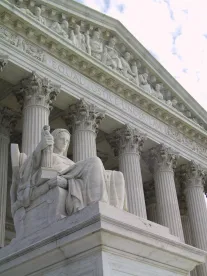On March 19, 2013, the United States Supreme Court issued a decision affecting class-action cases by limiting plaintiffs' ability to use a procedural loophole in their search for a favorable court.
The Supreme Court unanimously ruled in Standard Fire Ins. Co. v. Knowles that class-action plaintiffs cannot evade removal to federal court by stipulating, pre-certification, that they seek damages less than the jurisdictional threshold required for removal. In Knowles, the plaintiff filed a class action in Arkansas state court against Standard Fire Insurance Company, alleging that Standard Fire had unlawfully failed to include a general contractor fee in certain homeowner insurance loss payments and seeking to certify a class of hundreds, if not thousands, of similarly situated Arkansas policyholders.
Apparently hoping to remain in state court rather than having the case removed to federal court (a generally disfavored forum for class action plaintiffs for various reasons), Knowles stipulated in his complaint that "Plaintiff and the Class . . . will seek to recover total aggregate damages of less than five million dollars." By so stipulating, Knowles sought to evade the procedural jurisdictional minimum of $5 million set forth in the Class Action Fairness Act of 2005 (CAFA). He was initially successful, as after Standard Fire removed the case to Federal District Court, that court remanded the case because of the stipulation and in spite of its finding that the amount in controversy would have exceeded the jurisdictional minimum absent the stipulation.
In its unanimous decision written by Justice Stephen Breyer, the Supreme Court found that Knowles's stipulation was not binding on the class he purported to represent, as he could not legally bind members of a proposed class prior to that class being certified. Not being able to bind purported class members, "Knowles lacked the authority to concede the amount-in-controversy issue for absent class members." The Court further agreed with Knowles that stipulations to damages likely simplified the valuation of amounts in controversy in class actions, but found that ignoring the nonbinding stipulation only required judges to do what they would do in all those cases in which there is not a stipulation.
In short, while the Court agreed that an individual could limit the amount in controversy as to himself, that plaintiff could not "resolve the amount-in-controversy question [by stipulation] in light of his inability to bind the rest of the class." The Court thus found that the District Court had erred in accepting the stipulation as grounds for remand, vacating the judgment and remanding the case to the Federal District Court.
The Knowles v. Standard Fire decision is an important decision for employers, as it limits forum shopping by plaintiffs and allows cases to be removed to federal court where appropriate. Employers, however, must remain vigilant and mindful that plaintiffs' lawyers will likely continue to use creative pleading practices to stay out of federal court in cases where they view state court as the better forum.



 />i
/>i

